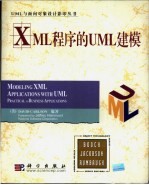

XML程序的UML建模PDF电子书下载
- 电子书积分:12 积分如何计算积分?
- 作 者:(美)卡尔森(Carlson,D.)编著
- 出 版 社:北京:科学出版社
- 出版年份:2004
- ISBN:703012491X
- 页数:333 页
PART Ⅰ FOUNDATIONS 1
Chapter 1 Convergence of Communities 3
Models for e-Business 4
Stakeholder Communities 5
Consumer 6
Business Analyst 8
Web Application Specialist 9
System Integration Specialist 10
Content Developer 10
Part Ⅰ. Foundations 11
Part Ⅱ. XML Vocabularies 11
ContentsForeword 11
Road Map for This Book 11
Part Ⅲ. Deployment 12
Steps for Success 13
Preface 15
Chapter 2 What Is an XML Application? 15
HTML, XML, and XHTML 15
XML Vocabularies 18
XML Presentation 23
Cascading Style Sheets 23
XSLT Stylesheets 26
Chapter Summary 29
Steps for Success 30
Chapter 3 What Is a UML Model? 31
Models and Views 32
Requirements Workflow 33
Use Case Diagram 33
Analysis Workflow 35
Activity Diagram 35
Model Management Diagram 37
Collaboration Diagram 37
Design Workflow 39
Class Diagram 40
Object Diagram 43
Sequence Diagram 45
Component Diagram 46
The Unified Process 47
Chapter Summary 49
Steps for Success 50
Chapter 4 e-Business Integration with XML 51
Use Case Analysis 52
Catalog Vocabulary Requirements 54
Shared Business Vocabularies 55
Define Business Vocabulary 55
Create XML Schema 56
Validate Message 59
Transform Message Content 60
Process Workflow and Messaging 61
Define Business Process 61
Build Workflow Model 62
Define Message Protocol 64
Application Integration 65
Create Application Classes 65
Create Legacy Adapter 67
Chapter Summary 68
Steps for Success 69
Chapter 5 Building Portals with XML 71
Use Case Analysis 72
Content Management 74
Define Business Vocabulary 74
Create Content 74
Assign Content Metadata 77
Portal Design 77
Design Portlet 78
Design Content Template 80
Create Stylesheet 81
Design Portal Layout 83
Customize Portal Layout 83
Wired and Wireless Convergence 84
Chapter Summary 86
Steps for Success 87
PART Ⅱ XML VOCABULARIES 89
Chapter 6 Modeling XML Vocabularies 91
What Is a Vocabulary? 91
CatML Vocabulary 93
Simplified Product Catalog Model 94
Mapping UML to XML 95
XML Metadata Interchange 97
Disassembling UML Objects into XML 99
UML Classes to XML Elements 99
Inheritance 101
UML Attributes to XML Elements 102
UML Attributes to XML Attributes 103
Enumerated Attribute Values 106
Mapping UML Compositions 107
Mapping UML Associations 109
Roots and Broken Branches 111
Packaging Vocabularies 113
FpML Vocabulary 114
UML Packages 115
XML Namespaces 117
Chapter Summary 119
Steps for Success 120
Chapter 7 From Relationships to Hyperlinks 121
Expanded CatML Vocabulary 122
XML Standards for Linking 125
XML ID and IDREF 126
XPath 128
XPointer 132
XLink 134
A Hyperlinked CatML Vocabulary 136
Negotiated Price Lists 137
Product Bundles 140
Product Details 142
Taxonomy of Categories 144
Chapter Summary 153
Steps for Success 154
Chapter 8 XMLDTDs and Schemas 155
The Role of an XML Schema 156
XML Document Type Definition 159
DTD Element Declarations and Content Model 159
DTD Attribute Declarations 162
DTD Entity Declarations 164
Limitations of DTDs 165
W3C XML Schema 166
Datatypes and Datatype Refinement 167
Schemas Compatible with DTDs 170
Advanced Schema Structures 175
Replacement or Coexistence? 179
Chapter Summary 179
Steps for Success 181
Chapter 9 Generating XML Schemas from the UML 183
Principles of Schema Generation 184
Generating DTDs 185
Relaxed DTDs 186
Strict DTDs 191
Generating W3C XML Schemas 194
Relaxed Schemas 194
Strict Schemas 201
XLink Support 203
Controlling Schema Strictness 205
UML Extension Profiles 205
An Extension Profile for XML 208
Profile Applied to CatML 209
Chapter Summary 214
Steps for Success 215
PART Ⅲ DEPLOYMENT 217
Chapter 10 Vocabulary Transformation 219
Reasons for XML Transformation 219
Alternative Vocabularies 220
Filtering Sensitive or Irrelevant Data 220
Introduction to XSLT 221
Presenting XML Documents 221
Exporting Non-XML Data 221
XSLT Processing Model 222
Transformation Rules 224
Integrating CatML with RosettaNet 226
Importing a RosettaNet Dictionary 227
Exporting a RosettaNet Sales Catalog 233
Chapter Summary 241
Steps for Success 242
Bibliography 242
Chapter 11 B2B Portal Presentation 243
Portal Analysis Model 244
Transforming XML Documents into Portlets 246
A Portlet for Product Display 249
A Portlet for Promotional Discounts 254
Discount Transformation 256
RSS Transformation 263
Chapter Summary 265
Steps for Success 265
Chapter 12 e-Business Architecture 267
Requirements for e-Business Architecture 268
Deploying Web Services 269
Message Protocols in XML 269
Web Service Description 272
Web Service Discovery 273
CatX Component Architecture 274
Display Portal Content 277
Update Newsfeed 277
Query Catalog Content 278
Integrate Supplier Catalog 279
Execute Currency Trade 279
Query Schema Repository 280
Query Service Registry 280
Chapter Summary 281
Steps for Success 283
PART Ⅳ APPENDIXES 285
Appendix A Reuse of FpML Vocabulary 287
Trading Party Model 291
Appendix B MOF and XMI 295
Meta Object Facility 295
XML Metadata Interchange 298
Appendix C UML Profile for XML 301
Introduction 301
Stereotypes 302
Bibliography Example 310
References 315
Index 317
- 《程序逻辑及C语言编程》卢卫中,杨丽芳主编 2019
- 《高等学校“十三五”规划教材 C语言程序设计》翟玉峰责任编辑;(中国)李聪,曾志华,江伟 2019
- 《改革进程中的刑事诉讼程序与证据问题研究 基于警察的视角》谢波 2019
- 《Java程序设计基础》罗刚 2018
- 《C++程序设计实验指导 第2版》张潇责任编辑;孟桂娥 2019
- 《C程序设计教程 第3版》林小茶,陈昕 2018
- 《Java语言程序设计教程》胡光 2018
- 《C语言程序设计》黑新宏,胡元义主编 2019
- 《C++语言程序设计习题与实验指导》姚雅鹃,石礼娟 2018
- 《内部行政程序研究》罗许生 2019
- 《指向核心素养 北京十一学校名师教学设计 英语 七年级 上 配人教版》周志英总主编 2019
- 《《走近科学》精选丛书 中国UFO悬案调查》郭之文 2019
- 《北京生态环境保护》《北京环境保护丛书》编委会编著 2018
- 《中医骨伤科学》赵文海,张俐,温建民著 2017
- 《美国小学分级阅读 二级D 地球科学&物质科学》本书编委会 2016
- 《指向核心素养 北京十一学校名师教学设计 英语 九年级 上 配人教版》周志英总主编 2019
- 《强磁场下的基础科学问题》中国科学院编 2020
- 《小牛顿科学故事馆 进化论的故事》小牛顿科学教育公司编辑团队 2018
- 《小牛顿科学故事馆 医学的故事》小牛顿科学教育公司编辑团队 2018
- 《高等院校旅游专业系列教材 旅游企业岗位培训系列教材 新编北京导游英语》杨昆,鄢莉,谭明华 2019
